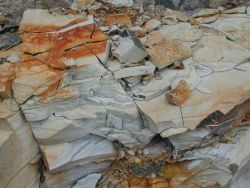Halifax Media Co-op
News from Nova Scotia's Grassroots
Dispatches from Durban - Racism Flowing Underneath Israeli Oil Shale
by Sonia Grant
“This settlement is where I was born and spent most of my life”, says Lia Tarachansky, pointing to a map of Israel during her presentation of Israeli oil shale plans. Tarachansky was a speaker at Everyone’s Downstream, a civil society conference on tar sands, climate change, and community resistance that took place in Durban, South Africa on November 25th and 26th in the lead up to COP-17.
Tarachansky goes on to explain that although Palestinian villages surrounded her settlement, while growing up she only met a single Palestinian person – the man who sold her vegetables at the local market. Tarachansky calls the segregation of Israelis and Palestines “apartheid” – a word that resonates particularly strongly here in South Africa. As soon as it is uttered, I feel the mood in the room grow tense. After all, it’s been less than two decades since apartheid ended in South Africa – institutionally, that is.
In July of 2011, a Canadian ship joined the freedom flotilla to Gaza to deliver humanitarian aid to Palestinians, and protest Israel’s economic sanctions against Palestine. This flotilla was supposed to leave from Greece, however it was stopped from doing so. Tarachansky’s explains her take on why this happened: Greece and Israel are planning to build a pipeline to transport oil between the two countries, and Greece was not willing to compromise this deal by allowing the flotilla to leave its port for Gaza.
There is an emerging energy industry in Israel: unconventional oil. According to Tarachansky, the majority of Israelis don’t know about it, so she travelled to Israel with MacDonald Stainsby to unearth the story behind Israel’s new interest in oil extraction. The government of Israel has known since the 1950s that the country is covered in shale, however it didn’t deem the industry worth developing until recent years, now that the price of oil has risen significant
In her presentation, Tarachansky spoke in particular about a proposed unconventional oil project in the Shfela Basin (between Tel Aviv and Jerusalem, where there is 250 billion barrels of oil) that will employ experimental technology to extract oil buried 160 meters below ground. Essentially, this process involves inserting hot rods into the ground for a period of 5-12 months, after which oil can be sucked out. It is an extremely energy-intensive technology, and also requires an enormous amount of fresh water. Transforming Shfela Basin into a site for exploration will mean the destruction of rich agricultural land, the pollution of air and water, and the generation large amounts of greenhouse gasses emissions.
Israeli Energy Initiatives (IEI) is the company behind the oil shale operation in the Shfela Basin. Like in Canada, where oil companies are exempt from paying corporate taxes, under the Israeli Petroleum Law, IEI isn’t required to pay taxes either (although it does pay the government 12.5% in royalties). Furthermore, if IEI proves successful (read: profitable) in its experimental phase of oil extraction in the Shfela Basin, the Israeli government will grant it all rights to land and water in the area.
Why is IEI involved in shale oil plans in Israel? The corporation’s first goal is to supply fuel to the Israeli military (the same military that has been responsible for destroying many Palestinian villages). A quick perusal of IEI’s website reveals something surprising:
Second only to “Sustainable Development”, one of IEI’s core values is Zionism. Tarachansky explains that a central current in Israeli energy discourse is the idea that Israel must develop a self-sufficient energy sector and disassociate itself with ‘Arab’ oil. Much like Ezra Levant’s Ethical Oil campaign in Canada that seeks to promote Canadian oil over that of other racialized nations, IEI’s objectives demonstrate how racism permeates the sphere that is often simply deemed “environmental”.
What to make of all this? First, I should be clear that my intentions in this reflection are not to engage in debates over the conflict between Israel and Palestine; an issue to which I cannot claim to speak, nor address in the space allotted. Rather, I want to point to how discourses of racism – such as Zionist discourses in Israel, or the racism projected onto Indigenous peoples in Canada living downstream from the Tar Sands – help produce and justify a business-as-usual approach to environmental regulation.
Just as it is important to unpack the social and environmental implications of an energy project like the one proposed for the Shfela Basin or the current operations in the Alberta Tar Sands, it is also imperative that we push ourselves to ask what social structures enable the systemic oppression – of which racism is just one of many forms – that sustains Big Oil. The Shfela Basin case shows that as climate organizers, we need to be challenging these manifestations of power in addition to the polluters that perpetuate them.
The site for the Halifax local of The Media Co-op has been archived and will no longer be updated. Please visit the main Media Co-op website to learn more about the organization.



